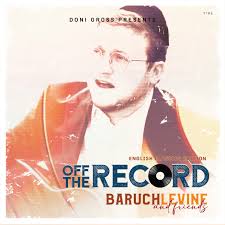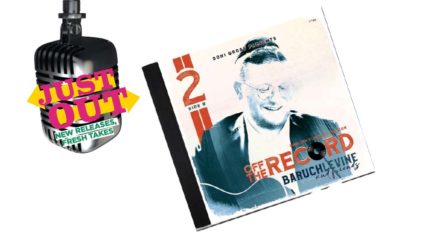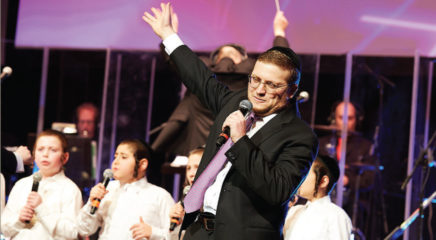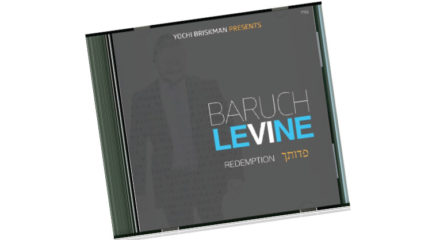“There’s something special about a message that hits you so directly, that you don’t even have to think”
The thing about BARUCH LEVINE’s new album, OFF THE RECORD, beyond the exquisite vocals and the sweetness, beyond the nostalgia of having 46 English classics on a single playlist, is that the songs speak your language.
“There’s something special about a message that hits you so directly, that you don’t even have to think,” says producer Doni Gross, regarding the songs off those records many of us listened to from decades past. Whether it’s “Forever One,” or “To Live a Life of Torah,” these tracks need no translation to make their way into listener’s hearts.
Doni and Baruch Levine started to work on this project by collecting over 160 songs. All of the songs they initially unearthed were inspiring English classics, but they were looking for songs that Baruch connected to personally or were part of his own musical experience growing up — and they wanted the perfect blend of slow and fast, happy and sad, music. The collection is built around six theme sections — Galus, Achdus, Emunah, Shabbos, Torah, and Mashiach — so that each selection reflects one of those concepts. The resulting medleys are seamless and moving, melding beloved tunes in the style of a well-managed camp kumzitz or choir, and decidedly approachable enough for listeners to sing along. Guest artists Rivie Schwebel, Simcha Leiner, Benny Friedman, and Joey Newcomb join Baruch in duets and harmonies representing the best of contemporary Jewish music.
The songs span different eras, from the 1970s (JEP’s “Dear Nikolai”) to contemporary (“Thank You Hashem”), via the 1980s and 1990s. They mix top-tier composers such as Abie Rotenberg with little-known lyricists whose contributions to Jewish music are all but forgotten. The inclusion of “Friendship” from Lost in Lazerland, Country Yossi’s “Little Kinderlach,” and “Someday I will Be” from Dov Dov and the Great Bicycle Race — their message profound, the tune and lyrics so child-friendly — feels like a warm wave from childhood and simpler years gone by.
“We weren’t afraid to use songs written for children,” says Baruch. “There’s something in that Dov Dov song that inspired me as a child, and still touches me now.” There is also plenty of Miami Boys Choir material, as Baruch says he’s always been an MBC fan.
Doni says that although some of these songs were released before he was born, he knew most of them previously. “My father sang on JEP as a kid, so we had the 1973 JEP Reach Out album at home, with ‘Dear Nikolai’ and other special songs. I was less familiar with the old Tzlil V’zemer recordings, such as ‘Aibishter,’ and ‘The Little Bird,’ but I came to love them.”
While the album will definitely be nostalgic for many, the messages are not tied to the 1970s or 1980s but are timeless concepts in Yiddishkeit. “One of the guys in the choir is just 23. He hardly knew any of these songs, but they really touched him,” Doni says. MBD’s “Let my People Go” and “Dear Nikolai” reflect on Soviet oppression in modern history, and although older listeners lived through those years, Baruch says he’s explained the background of those songs to younger listeners.
Some of the feedback has been, “I always loved this song, but I could never get the lyrics straight until now.” Thanks to digital recording technology, the 2021 version lets listeners hear and appreciate the words of the songs that might have been unclear in the original recording. Still, Doni’s goal was not to reinvent the classics, but to be true to the original compositions and lyrics, retaining their flavor down to the arrangements and chords. One exception was Shlomo Carlebach’s “Mizmor Shir,” where they allowed themselves to riff on Carlebach’s traditional three-chords-only tune.
Yaakov Brown, who worked on the project as song curator, tracked down the original recordings and album jackets so the words would be accurate, but it wasn’t always easy to find the original songwriters. The old JEP songs, for example, used popular Jewish niggunim and added English lyrics. Yaakov reached out to Moshe Hauben, Rabbi Yosef Chaim Golding, Rabbi Chaim Dovid Zweibel, and others who were involved back then, retracing a path to Camp Munk 50 years ago and giving credit to whoever really came up with the lyrics. It certainly says something about staying power that a song composed in a camp dining room half a century ago can still touch listeners today.
(Originally featured in Mishpacha, Issue 844)






